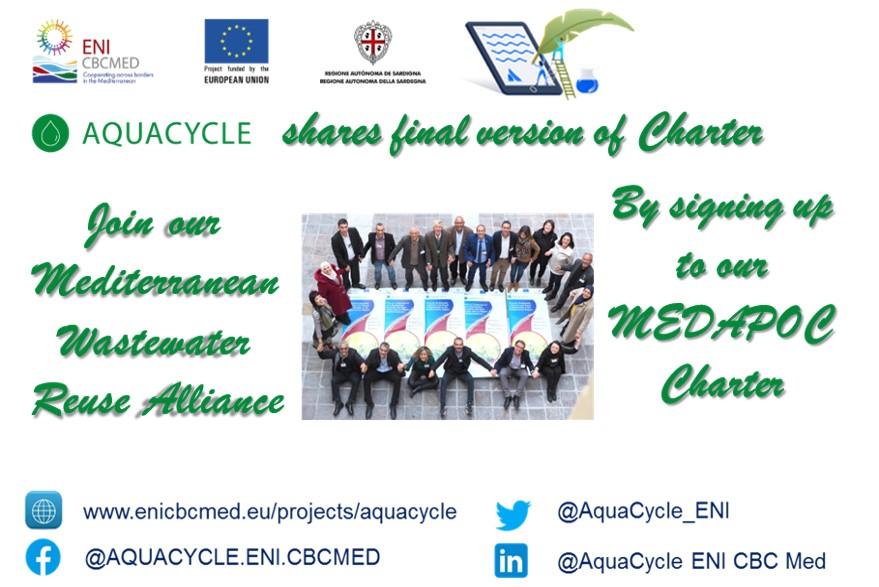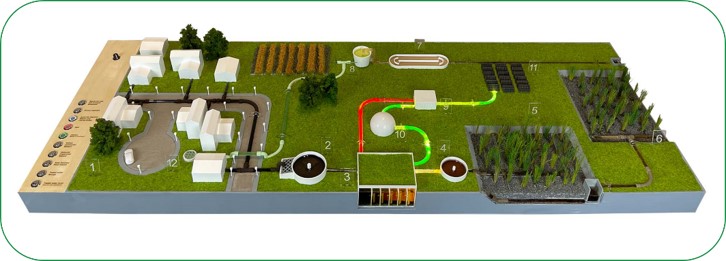AQUACYCLE shares final version of Charter

By signing up to the Charter, you will be joining our Mediterranean Wastewater Reuse Alliance.
The content of the Charter can be downloaded in English through this link, while the registration form to sign up to the Charter can be accessed through this link.
The scope of the Charter is to embrace the sustainable use of nonconventional water resources and to promote the transfer and knowledge sharing of AQUACYCLE’s research outcomes at the operational level. In doing so, the Charter aspires to set a common vision for the establishment of a cross-border Mediterranean Wastewater Reuse Alliance, i.e. a community that is aware of the need to accelerate the reuse of treated domestic effluent which presents itself as an all-year-round available resource.
The acronym APOC stands for “Anaerobic digestion”, “Photocatalytic Oxidation” and “Constructed wetland(s)”, the three components of an eco-innovative system for the treatment of domestic wastewater, as shown by the 3-dimensional miniature replica below.

Rather than bringing the voices of the research teams who designed, tested, and validated the APOC technology, the present Charter foremost brings the voices of farmers and local communities from the three geographic locations, shown in the figure below, where a pilot demonstration unit of the APOC technology has been installed: (1) a site owned by the real estate company SANABEL in Deddeh, south of Tripoli in North Lebanon; (2) at the existing anaerobic wastewater treatment facility of Blanca in the Murcia Region of Spain; and (3) at the existing wastewater treatment facility of Bent Saidane in the Zaghouan Governorate of Tunisia. The three sites have in common that they represent small to medium sized communities whose livelihoods depend primarily on agriculture.

To start with, through this Charter, farmers alert to a dire future to sustain their livelihoods in the face of ever dwindling freshwater supplies. Next, local community representatives share their views on the reuse of treated wastewater and their expectations of the APOC treatment system. The research in AQUACYCLE also provided an opportunity to demonstrate that it is entirely possible for local communities to take an active role in the drawing up of action plans for the reuse of treated wastewater. This is followed by the appraisal of farmers and local communities who participated in Participatory GIS (PGIS) Practice sessions that were organized in Lebanon and in Tunisia for this purpose. These initial chapters were issued as a semi-final version of the present Charter, to mark World Water Day in 2023, which ran with the theme accelerating change to solve the water and sanitation crisis.
The added chapters in this final version of the Charter, bring the views of policy- and decision-making authorities in the water, agricultural, sanitation and health-related sectors on the functionality of an online Irrigation Support Tool. The latter guides on the generation of optimal action plans for the reuse of treated wastewater, based on economic, environmental and social criteria of the user’s choice. It also proved opportune to dedicate a chapter to the level of satisfaction expressed by farmers around the Mediterranean with the current measures put in place by public authorities to combat land and water degradation. Last but not least, the Charter brings the viewpoints expressed by experts and trend-setters in Spain on the reuse of treated wastewater and on the prospects for the APOC technology to meet the recently introduced EU Regulation on the Minimum Requirements for Water Reuse.









